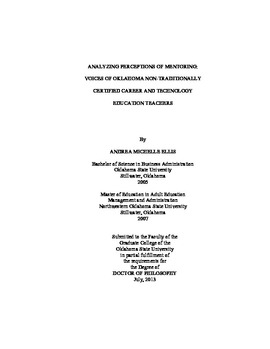| dc.contributor.advisor | Cole, Belinda | |
| dc.contributor.author | Ellis, Andrea Michelle | |
| dc.date.accessioned | 2014-09-24T14:16:55Z | |
| dc.date.available | 2014-09-24T14:16:55Z | |
| dc.date.issued | 2013-07 | |
| dc.identifier.uri | https://hdl.handle.net/11244/11013 | |
| dc.description.abstract | The purpose of this research was to examine mentoring practices for new teachers. In an effort to analyze the characteristics of effective mentors and mentoring practices, the primary goal of this study was to determine Oklahoma non-traditionally certified CTE teachers' perceptions of characteristics and elements of the mentoring process from the perspective of the new teacher. This research focused on progressivism as a philosophy through which mentoring theory, learning transfer theory, teacher induction programs, and teacher retention/attrition were studied. Eighty-four non-traditionally certified CTE teachers in Oklahoma participated in an online survey regarding mentor characteristics and mentoring program elements. The online survey used the Mentor Role Instrument (MRI) and the Survey of Mentors of Beginning Teachers (SMBT) in addition to a demographics section. A link to the online survey was distributed via the researcher's email. The results of the online survey were analyzed and statistically significant results were found in many areas. For the MRI, the psychosocial mentor roles appear to be more influential on a positive perception of the mentor than the career development mentor roles. The acceptance and friend mentor roles had the highest mean score for the participants. All four of the SMBT factor areas (teacher involvement/support, staff development, administrative support, resource materials) were considered relatively important for mentoring programs by the participants in this study. Of the four factor areas, teacher involvement/support held the highest mean score. The protoge teachers mentioned having the most difficulties in the areas of learning district policies/being new, their mentor not being helpful, and instructional methods/classroom management. Overall, the protoge teachers wanted more help with culture, procedures, and deadlines within their positions. Finally, recommendations for further research and recommendations for practice were stated. | |
| dc.format | application/pdf | |
| dc.language | en_US | |
| dc.rights | Copyright is held by the author who has granted the Oklahoma State University Library the non-exclusive right to share this material in its institutional repository. Contact Digital Library Services at lib-dls@okstate.edu or 405-744-9161 for the permission policy on the use, reproduction or distribution of this material. | |
| dc.title | Analyzing perceptions of mentoring: Voices of Oklahoma non-traditionally certified career and technology education teachers | |
| dc.contributor.committeeMember | Self, Mary Jo | |
| dc.contributor.committeeMember | Ausburn, Lynna J. | |
| dc.contributor.committeeMember | Krumm, Bernita L. | |
| osu.filename | Ellis_okstate_0664D_12893.pdf | |
| osu.accesstype | Open Access | |
| dc.type.genre | Dissertation | |
| dc.type.material | Text | |
| dc.subject.keywords | alternative certification | |
| dc.subject.keywords | careertech | |
| dc.subject.keywords | learning transfer | |
| dc.subject.keywords | mentoring | |
| dc.subject.keywords | progressivism | |
| dc.subject.keywords | teacher induction | |
| thesis.degree.discipline | Occupational Education Studies | |
| thesis.degree.grantor | Oklahoma State University | |
